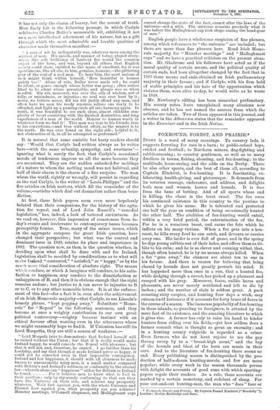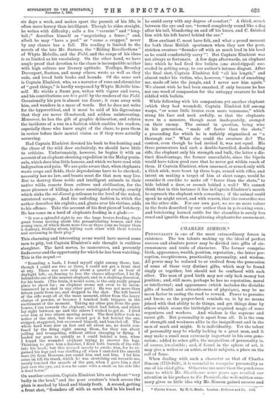FOXHOUND, FOREST, AND PRAIRIE.*
SPORT is a word of many meanings. To country lads, it suggests ferreting for rats in a barn ; to public-school boys, cricket and football ; to Northern miners, dog-fighting and rabbit-coursing ; to country gentlemen, as well as to many dwellers in towns, fishing, shooting, and fox-hunting; to the multitude, horse-racing, and the odds on the Derby. There be also other sports, and the best of them all, according to Captain Elmhirst, is fox-hunting. It is fascinating, ex- hilarating, health-giving, and picturesque. It demands from its votaries courage, endurance, and address, and delights both men and women, horses and hounds. It is free from the bane of betting. And of all sports whose end is killing, the chase is the least cruel. The fox owes his continued existence in this country to the pastime to which he gives his name. He is tolerated and protected one half the year on condition of being occasionally hunted the other half. The abolition of fox-hunting would entail, within a very brief period, the extermination of the fox. For he is a voracious beast, and earns the fate which he inflicts on his many victims. When a fox gets into a hen- roost, he kills every fowl he can catch, and devours or carries away one. His larder is ever full of game, and in the spring he digs young rabbits out of their holes, and offers them as tit- bits to his cubs; and he is so clever and cunning withal, that, though often hunted, he is by no means always killed. When a fox "goes away," the chances are about ten to one in his favour. And there is reason for believing that being chased by hounds does not greatly perturb his mind. It has happened more than once in a run, that a hunted fox, while dodging through a covert, has picked up a pheasant and escaped with his prey. Moreover, foxes, unlike hares and pheasants, are never merely mutilated and left to die by inches ; and the number of slain is seldom great. A pack counting sixty couples, and hunting four days a week, may esteem itself fortunate if it accounts for forty brace of foxes in the course of a season. The immense popularity of fox-hunting in these islands, so puzzling to foreigners, is attested by the mere fact of its existence, and the amazing literature to which it gives rise. A farmer has only to raise his hand to hinder hunters from riding over his fields,—yet how seldom does a
farmer commit what is thought so great an enormity; and in a hunting county vulpicide is regarded as a crime. Even farmers who do not hunt rejoice to see the gay throng sweep by to a " breast-high scent," and the bay of the hounds and blast of the horn are music in their ears. And to the literature of fox-hunting there seems no end. Every publishing season is distinguished by the pro- duction of half-a-dozen hunting-novels, and few are more popular; while every week in the season thousands peruse with delight the accounts of good runs with which sporting- papers regale their readers. As a rule, these accounts are marked by a certain monotony, and redolent of slang. For your out-and-out hunting-man, the man who " does " four or
* Foxhound, Forest, and Prairie. By Captain Pennel Elmhirst (" Brooksby"). London ; George Roatledge and Sons.
six days a week, and makes sport the pursuit of his life, is often more horsey than intelligent. Though he rides straight, he writes with difficulty; calls a fox " varmint " and " long- tail ;" describes himself as "negotiating a fence ;" and, albeit he may "have a purl" or "come a cropper," never by any chance has a fall. His reading is limited to the novels of the late Mr. Surtees, the " Riding Recollections " of Whyte Melville, and the Field, and the range of his ideas is as limited as his vocabulary. On the other hand, we have ample proof that devotion to the chase is incompatible neither with high culture nor literary aptitude. Trollope, Bromley Davenport, Surtees, and many others, wrote as well as they rode, and loved both books and hounds. Of the same sort is Captain Elmhirst, who, as a narrator of runs and chronicler of " good things," is hardly surpassed by Whyte Melville him- self. He wields a fluent pen, writes with vigour and verve, and his contributions are tries gouts by the readers of the Field.
Occasionally his pen is almost too fluent ; it runs away with him, and wanders in a maze of words. But he does not write for the hypercritical, and it must be said of his digressions that they are never ill-natured, and seldom uninteresting. Moreover, he has the gift of graphic delineation, and relates the incidents of a ran in a fashion which enables his readers, especially those who know aught of the chase, to pass them in review before their mental vision as if they were actually occurring.
Had Captain Elmhirst devoted his book to fox-hunting and the chase of the wild deer exclusively, we should have little to criticise. Unfortunately, however, he begins it with an account of an elephant-shooting expedition in the Malay penin- sula, which does him little honour, and which we have read with indignation and pain. We are quite aware that, when elephants waste crops and fields, their depredations have to be checked; necessity has no law, and beasts must die that men may live. But to destroy these noble and intelligent animals in their native wilds, remote from culture and civilisation, for the mere pleasure of killing, is sheer unmitigated cruelty, cruelty which sinks the soi-disant gentleman to the level of the naked, untutored savage. And the unfeeling fashion in which the author describes his exploits, and gloats over his victims, adds to his offence. Take the account of his first piece of butchery. He has come on a herd of elephants feeding in a glade :—
" It was a splendid sight to see the huge brutes feeding, their great forms moving about like perambulating houses, and the young ones, of which there were two or three (one no larger than a donkey), frisking about, hitting each other with their trunks and screaming in their play."
This charming and interesting scene would have moved some men to pity, but Captain Elmhirst's sole thought is ruthless slaughter. The herd moves, he manceuvres, and presently finds cover and the opportunity for which he has been watching.
This is the sequel:— "Bounding a bush, I found myself right among them; but, though I could see two or three, I could not get a front shot at any. There was now only about a quarter of an hour of daylight left ; so, fearing to lose the chance altogether, I let fly behind the ear of the nearest elephant, and in a slanting direction, for his brain. (The brain, it would seem, is the only really proper place to shoot for ; an elephant seems not even to be incon- venienced by a shot in any other part.) He was not more than fifteen yards from me, and dropped to the shot. The left barrel of the rifle went off at the same moment, either from the heavy charge of powder, or because I touched both triggers in the excitement of the moment. Taking my other gun from the gun- bearer, I ran towards the elephant, which had fallen, and which lay right between me and the others I wished to get at. I fired over him at two others moving across. The first fellow took no notice of the shot, but the second got it hot behind the ear, stopped, staggered, but recovered himself, and bundled off. The whole herd were now on foot and all about me, no doubt con- fused by the firing right among them, for they ran about yelling and trumpeting, without either charging or flying. I loaded my guns as quickly as I could behind a tree, when I found the wounded elephant trying o recover his legs. Thinking to give him a finisher, I fired both barrels of the rifle into his head ; but this seemed merely to awake him, for he re- gained his legs and was shuffling off when I snatched the smooth bore (8) from Houssan, ran round him and met him. I let him come on till his trunk, which he was stretching out towards me, nearly touched the muzzle of the gun, when I gave him a shot just over the eye, and down he came with a crash on his side like a dead horse."
On another occasion, Captain Elmhirst hits an elephant " very badly in the head," and the poor creature's track across the plain is marked by blood and bloody froth. A second, getting a front shot, ‘`flounders off with as much lead in his head as he could carry with any degree of comfort." A third, struck between the eye and ear, "turned completely round like a dog after his tail, blundering on and off his knees, and C. finished him with his left barrel behind the ear."
How exultant C. must have felt, and what a proud moment for both these British sportsmen when they saw the poor, stricken creature "flounder off with as much lead in his bead as he could comfortably carry "1 But Captain Elmhirst was not always so fortunate. A few days afterwards, an elephant into which he had fired five bullets (one steel-tipped) suc- ceeded in getting away, to our author's intense disgust. After the final shot, Captain Elmhirst fell " all his length," and almost under his victim, who, however, " instead of smashing me, made off into the jungle, and I never saw him again." We almost wish he had been smashed, if only because he has not one word of compassion for the unhappy creature he had riddled with bullets.
While following with his companions yet another elephant (which they had wounded), Captain Elmhirst fell among wasps, "or some little brutes even more venomous," which stung his face and neck awfully, so that the elephants were in a measure, though most inadequately, avenged on their enemy. The animal in question, being wise in his generation, " made off faster than the shots," a proceeding for which he is unfairly stigmatised as " a thorough cur." What else could the creature do ? The contest, even though he had invited it, was not equal. His three persecutors had each a double-barrelled, death-dealing rifle, the elephant only his strength and bulk, the latter a dis- tinct disadvantage, the former unavailable, since the bipeds would have taken good care that be never got within reach of them. If Captain Elmhirst, when unarmed, or armed only with a thick stick, were beset by three boys, armed with rifles, and intent on making a target of him at short range, would he consider it cur-like to make off "faster than the shots," to hide behind a door, or crouch behind a wall ? We cannot think that in this instance it lies in Captain Elmhirst's mouth to reproach the elephant with cowardice ; if the animal could speak he might retort, and with reason, that the cowardice was on the other side. For our own part, we see no more valour in the feats described by our author than in pole-axing oxen ; and butchering horned cattle for the shambles is surely less cruel and ignoble than slaughtering elephants for amusement.























































 Previous page
Previous page